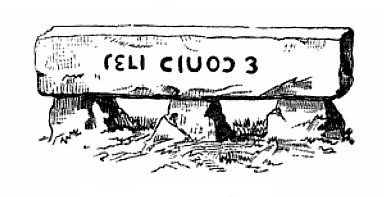
The South African flower Mesembryanthemum draws its name from the Greek roots for middle, embryo, and flower.
It’s believed to be the English word containing the highest “score” in Roman numerals — four Ms.

The South African flower Mesembryanthemum draws its name from the Greek roots for middle, embryo, and flower.
It’s believed to be the English word containing the highest “score” in Roman numerals — four Ms.
Slips of the tongue are often made on the stage, even by the most prominent actors and actresses. Mrs. Langtry at one performance said to her stage lover, ‘Let us retire and seek a nosey cook.’
An actor at the Queen’s Theatre, Manchester, turned ‘Stand back, my lord, and let the coffin pass’ into, ‘Stand back, my lord, and let the parson cough.’ …
A well-known actor who has often been applauded by New York theater-goers, in one of his speeches intended to say, ‘Royal bold Caesar,’ but forgot himself in his excitement and said, ‘Boiled rolled Caesar, I present thee with my sword.’
— John De Morgan, In Lighter Vein, 1907
kerdomeletia
n. an excessive desire for material wealth
lucrifaction
n. the process of becoming wealthy
Words of which William Shakespeare was the only recorded user, at some point, according to the Oxford English Dictionary:
In Inventing English, Stanford literary historian Seth Lerer credits him with inventing nearly 6,000 new words.
latibulate
v. to hide oneself in a corner
Advance each letter in GNAT 13 places through the alphabet and you’ll get GNAT reversed — or TANG:

Advertisement in a Manchester paper, 1829:
SPANKER:
The Property of O— D—.
Saturday, the 16th September next, will be sold, or set up for sale, at Skibbereen:
A strong, staunch, steady, sound, stout, safe, sinewy, serviceable, strapping, supple, swift, smart, sightly, sprightly, spirited, sturdy, shining, sure-footed, sleek, smooth, spunky, well-skinned, sized, and shaped sorrel steed, of superlative symmetry, styled SPANKER; with small star and snip, square-sided, slender-shouldered, sharp-sighted, and steps singularly stately; free from strain, spavin, spasms, stringhalt, staggers, strangles, surfeit, seams, strumous swellings, scratches, splint, squint, scurf, sores, scattering, shuffling, shambling-gait, or sickness of any sort. He is neither stiff-mouthed, shabby-coated, sinew-shrunk saddlebacked, shell-toothed, skin-scabbed, short-winded, splay-footed, or shoulder-slipped; and is sound in the sword-point and stifle-joint. Has neither sick-spleen, sleeping-evil, snaggle-teeth, subcutaneous sores, or shattered hoofs; nor is he sour, sulky, surly, stubborn, or sullen in temper. Neither shy nor skittish, slow, sluggish, or stupid. He never slips, strips, strays, starts, stalks, stops, shakes, snivels, snaffles, snorts, stumbles, or stocks in his stall or stable, and scarcely or seldom sweats. Has a showy, stylish switch-tail, or stern, and a safe set of shoes on; can feed on stubble, sainfoin, sheaf-oats, straw, sedge, or Scotch grass. Carries sixteen stone with surprising speed in his stroke over a six-foot sod or a stone wall. His sire was the Sly Sobbersides, on a sister of Spindleshanks by Sampson, a sporting son of Sparkler, who won the sweepstakes and subscription plate last session at Sligo. His selling price is sixty-seven pounds, sixteen shillings and sixpence sterling.
Quoted in William T. Dobson, Literary Frivolities, Fancies, Follies and Frolics, 1880.

imbriferous
adj. bringing rain
impluvious
adj. wet with rain
mushfaker
n. a repairer of umbrellas

In Collectanea de Rebus Hibernicus, his 1791 disquisition on Irish antiquities, Charles Vallancey describes a group of sepulchral stones on the Hill of Tara, one of which is inscribed BELI DIVOSE, “To Belus, God of Fire.”
Vallancey goes into some detail interpreting this as an altar to Baal. It turned out later that a wanderer had lain upon the stone and idly carved his name and the date upside down: E. CONID 1731.
Vallancey’s reaction is not recorded.